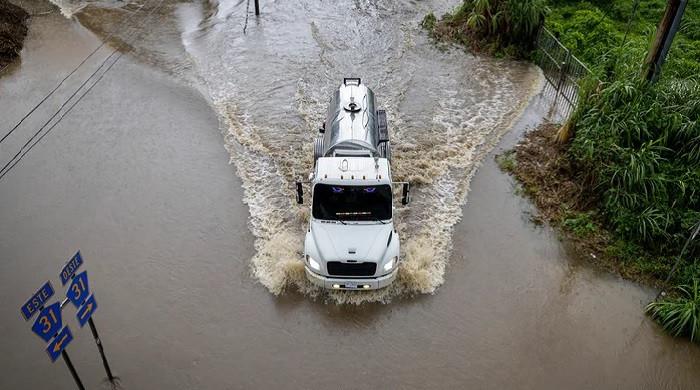Politics
Erin’s explosive growth hammers Caribbean, raises flooding risks for US coast


Hurricane Erin’s massive footprint battered Caribbean islands with heavy gusts and downpours on Monday, as it threatened rip currents and flooding along the US East Coast later this week, even without a predicted landfall.
The Category 4 storm strengthened dramatically over the weekend in a historic burst of intensification, scientists said was fueled by human-caused climate change. It briefly peaked as a Category 5 hurricane before weakening slightly.
In its latest advisory, the US National Hurricane Center said the Atlantic season’s first hurricane was packing maximum sustained winds of 140 miles (220 kilometres) per hour while moving northwest at 10 mph.
Erin is “unusually large,” with hurricane force winds extending 80 miles and tropical storm winds extending 230 miles, the NHC said.
The storm’s outer bands were forecast to dump rain across Cuba and the Dominican Republic through Monday, as well as the Turks and Caicos and the Bahamas — where a tropical storm warning is in place — into Tuesday.
These regions could receive localised totals of up to six inches (15 centimetres) of rain, according to the NHC.
The agency’s deputy director, Jamie Rhome, warned Americans not to assume the hurricane won’t impact them simply because its track keeps it offshore.
“Nothing could be further from the truth for portions of the Mid-Atlantic, especially the Outer Banks of North Carolina,” he said. On Wednesday and Thursday, waves of up to 20 feet (six meters), coastal flooding and storm surge “could overwash dunes and flood homes, flood roads and make some communities impassable,” he said.
Evacuations have been ordered for two North Carolina islands, Ocracoke and Hatteras.
From Tuesday, much of the East Coast will face a high risk of life-threatening surf and rip currents, which occur when channels of water surge away from the shore.
In Puerto Rico, a US territory of more than three million people, weekend flooding swamped homes and roads in the island’s east, and widespread power outages left residents in the dark, though nearly all service has since been restored.
Climate link
“Erin is one of the fastest, most intensifying storms in the modern record,” Daniel Gilford, a climate scientist at the nonprofit Climate Central, told AFP.
“We see that it has intensified over these warm surface temperatures — and this makes a lot of sense, because we know that hurricanes act like heat engines taking up energy from the ocean surface, converting that energy into winds.”
According to Climate Central, Erin travelled over waters whose extreme warmth was made up to 100 times more likely through climate change.
The Atlantic hurricane season, which runs from June 1 to November 30, has now entered its historical peak.
Despite a relatively quiet start with just four named storms so far, the National Oceanic and Atmospheric Administration (NOAA) continues to forecast an “above-normal” season.
A typical season produces 14 named storms, of which seven become hurricanes and three strengthen into major hurricanes.
This year, tropical activity is expected to be elevated by a combination of warmer-than-average sea-surface temperatures in the tropical Atlantic and Caribbean, along with an active West African monsoon, NOAA said.
Scientists broadly agree that climate change is supercharging tropical cyclones: warmer oceans fuel stronger winds, a warmer atmosphere intensifies rainfall, and higher sea levels magnify storm surge.
Climate change may also be making hurricanes more frequent.
Politics
Trump threatens military action over Minnesota protests


- Trump issues threat after ICE officer shot Venezuelan man.
- Says he may deploy military force in Minnesota.
- Minnesota leaders say ICE actions are ‘disgusting and intolerable.
WASHINGTON: US President Donald Trump threatened on Thursday to invoke the Insurrection Act to deploy military forces in Minnesota after days of angry protests over a surge in immigration agents on the streets of Minneapolis.
Confrontations between residents and federal officers have become increasingly tense after an Immigration and Customs Enforcement agent fatally shot a US citizen, Renee Good, in a car eight days ago in Minneapolis, and the protests have spread to other cities. Trump’s latest threat came a few hours after an immigration officer shot a Venezuelan man who the government said was fleeing after agents tried to stop his vehicle in Minneapolis. The man was wounded in the leg.
“If the corrupt politicians of Minnesota don’t obey the law and stop the professional agitators and insurrectionists from attacking the Patriots of ICE, who are only trying to do their job, I will institute the INSURRECTION ACT,” Trump wrote on social media.
Trump, a Republican, has for weeks derided the state’s Democratic leaders and called people of Somali origin there “garbage” who should be “thrown out” of the country.
He has already sent nearly 3,000 federal officers into the Minneapolis area, who have carried guns through the city’s icy streets, wearing military-style camouflage gear and masks that hide their faces.
They have been met day and night by loud, often angry protests by residents, some blowing whistles or banging tambourines. On Wednesday night, crowds of nearby residents gathered near the area where the Venezuelan man was shot. Some shouted in protest, and federal officers ignited flash-bang grenades and released clouds of tear gas.
Later, after most of the residents had been dispersed, a small group vandalised a car they believed belonged to the federal officers, one person daubing it with red graffiti saying: “Hang Kristi Noem,” in reference to the Homeland Security secretary who oversees ICE.
Since the surge began, agents have arrested both immigrants and protesters, at times smashing windows and pulling people from their cars, and have been shouted at for stopping Black and Latino US citizens to demand identification.
‘Disgusting and intolerable’
The US Department of Homeland Security, which is overseeing Trump’s immigration crackdown, identified the man its officer shot as Julio Cesar Sosa-Celis. He had been allowed into the US by the administration of Trump’s predecessor, Joe Biden, in 2022 through the government’s humanitarian parole programme. The Trump administration has since revoked the parole granted to Venezuelans and others admitted under Biden.
In its statement, DHS called him a convicted criminal under Minnesota law after being caught driving without a licence and giving a false name to a police officer. Court records of those cases reviewed by Reuters show he was only convicted of “petty misdemeanours”, which Minnesota state law says do “not constitute a crime”, and for which the maximum punishment is a $300 fine.
According to the DHS account, federal officers tried to stop Sosa-Celis in his vehicle. He fled the scene in his vehicle, crashed into a parked car, and then ran away on foot, the DHS said.
One officer caught him and while the two were “in a struggle on the ground”, two other Venezuelan men came out of a nearby apartment and “attacked the law enforcement officer with a snow shovel and broom handle”, the statement said.
Sosa-Celis got loose and began hitting the officer with “a shovel or a broomstick”, and so the officer “fired defensive shots to defend his life”, the DHS statement said.
Reuters was not able to verify the account given by DHS. The men fled into the apartment and all three were arrested after officers went in, DHS said. Sosa-Celis and the officer were recovering in hospital from injuries, according to the department and city officials.
The Trump administration and Minnesota leaders have each blamed the other for stoking anger and violence.
In a late-night press conference, Mayor Jacob Frey called the ICE surge an invasion and said he had seen “conduct from ICE that is disgusting and is intolerable”.
“We cannot be at a place right now in America where we have two governmental entities that are literally fighting one another,” Frey said, calling for peace.
Trump supporters divided over immigration enforcement
The Insurrection Act of 1807 is a law allowing the president to deploy the military or federalise soldiers in a state’s National Guard to quell rebellion, an exception to laws that prohibit soldiers being used in civil or criminal law enforcement.
It has been used 30 times in US history, according to New York University’s Brennan Centre for Justice. The Supreme Court has ruled that the president alone can determine if the act’s conditions have been met.
Trump has already taken the unusual step of federalising National Guard soldiers to help with immigration law enforcement in Democrat-run cities over the objections of state governors, including in Los Angeles last year, which a judge ruled in December was unconstitutional.
Trump’s aggressive moves in Minnesota have divided his supporters: 59% of Republicans favoured a policy prioritising arrests by immigration officers even if people get hurt, while 39% said officers should focus on not harming people even if it means fewer arrests, according to a Reuters/Ipsos survey released on Thursday.
If Trump sends soldiers to Minnesota, he would almost certainly face legal challenges by the state. The Minnesota attorney general’s office has already sued the Trump administration this week, saying ICE agents were engaged in a “pattern of unlawful, violent conduct”, including racial profiling and forced entry into residents’ homes without warrants. The American Civil Liberties Union also filed a similar lawsuit against the Trump administration on Thursday.
At a brief hearing on Wednesday, Minnesota asked US District Judge Kate Menendez to issue a temporary order restraining the ICE surge.
Menendez ordered the Trump administration to respond by Monday, saying she would rule after that, calling the issues raised by Minnesota’s lawsuit “enormously important”.
Politics
US imposes sanctions on Iran over ‘crackdown’ on protesters


- Treasury dept accuses forces of being architects of crackdown.
- US says tracking Iranian leaders’ funds being wired to banks.
- Trump questions Reza Pahlavi’s ability garner support in Iran.
The United States on Thursday imposed sanctions on five Iranian officials it accused of being behind the crackdown on protests and warned it was tracking Iranian leaders’ funds being wired to banks around the world, as US President Donald Trump’s administration increases pressure on Tehran.
The US Treasury Department, in a statement, said it imposed sanctions on the Secretary of the Supreme Council for National Security as well as Islamic Revolutionary Guard Corps and law enforcement forces commanders, accusing them of being architects of the crackdown.
Treasury Secretary Scott Bessent, in a video on Thursday, said Washington’s message to Iran’s leaders was clear: “US Treasury knows, that like rats on a sinking ship, you are frantically wiring funds stolen from Iranian families to banks and financial institutions around the world. Rest assured, we will track them and you.”
“But there’s still time, if you choose to join us. As President Trump has said, stop the violence and stand with the people of Iran.”
The unrest in Iran started with protests over soaring prices before turning into one of the biggest challenges to the establishment since the 1979 Islamic Revolution.
Trump has repeatedly threatened to intervene on behalf of protesters in Iran, where the establishment has cracked down hard on nationwide unrest since December 28.
“The United States stands firmly behind the Iranian people in their call for freedom and justice,” Bessent said in the statement. “Treasury will use every tool to target those behind the regime’s tyrannical oppression of human rights.”
The Treasury also imposed sanctions on 18 people it accused of involvement in laundering the proceeds of Iranian petroleum and petrochemical sales to foreign markets as part of “shadow banking” networks of sanctioned Iranian financial institutions.
Thursday’s action is the latest move targeting Tehran since Trump restored his “maximum pressure” campaign on Iran, which includes efforts to drive its oil exports to zero and help prevent Tehran from developing a nuclear weapon.
Trump questions Pahlavi’s ability to lead Iran
Separately, Trump — in an exclusive Reuters interview in the Oval Office — said that Iranian opposition figure Reza Pahlavi “seems very nice” but expressed uncertainty over whether Pahlavi would be able to muster support within Iran to eventually take over.

“He seems very nice, but I don’t know how he’d play within his own country,” Trump said. “And we really aren’t up to that point yet.
“I don’t know whether or not his country would accept his leadership, and certainly if they would, that would be fine with me.”
Trump’s comments went further in questioning Pahlavi’s ability to lead Iran, after he said last week that he had no plans to meet with him.
The US-based Pahlavi, 65, has lived outside Iran since before his father was toppled in the 1979 Islamic Revolution and has become a prominent voice in the protests.
Echoing Trump’s caution, Sanam Vakil, deputy director of Chatham House’s Middle East and North Africa Program, said Pahlavi had gained prominence among some protesters and had helped mobilise them to some extent. “But I wouldn’t overstate it. It’s very hard to see how much support he has or how much support any figure has in Iran,” she said.
Trump said it is possible the government in Tehran could fall due to the protests but that in truth “any regime can fail.”
“Whether or not it falls or not, it’s going to be an interesting period of time,” he said.
Politics
Rift emerges within top Afghan Taliban leadership


Four years into their rule in Afghanistan, the Afghan Taliban regime has reportedly been rocked by internal rifts, with key leaders pitted against each other.
The Taliban declared the war in Afghanistan was over after they took control of the presidential palace in Kabul on August 15, 2021, and the United States withdrew its forces from the war-ravaged country.
However, rifts have emerged within the Afghan Taliban ranks, with Supreme Leader Hibatullah Akhundzada warning that internal disagreements could bring them all down.
The BBC, citing an audio leak it obtained, reported that Akhundzada had voiced his concerns over division within the Taliban ranks.
In the leaked clip, purportedly from one of his speeches at a religious seminary in Kandahar in January 2025, Akhundzada can be heard warning that “the emirate will collapse and end” as a result of the ongoing divisions.
The publication, citing insiders, stated that the Afghan Taliban have been divided into two distinct groups: the Kandahar group and another based in the capital Kabul.
The Kandahar group remains loyal to Akhundzada, who is operating from his base in Kandahar, where leaders loyal to him control every aspect of the Afghan society.
The group includes Afghanistan Prime Minister Mohammad Hassan Akhund, Chief Justice Abdul Hakim Haqqani and Higher Education Minister Neda Mohammad Nadim.
The group is working towards the Taliban supreme leader’s vision of a strict Emirate that is isolated from the modern world.
The second group, comprising powerful Taliban members, is largely based in Kabul and advocates for engagement with the outside and allows girls and women access to education.
Afghanistan Deputy Prime Minister Abdul Ghani Baradar, Interior Minister Sirajuddin Haqqani, and Defence Minister Mohammad Yaqood Mujahid make up the Kabul group.
The BBC, citing a Taliban insider, described the situation as “the Kandahar house versus Kabul”.
According to the publication, the conflict between the two groups became evident in September last year, following the Taliban supreme leader’s directive to suspend internet and mobile phone services.
However, the services were restored three days later without any explanation given by the Afghan Taliban regime.
Citing Taliban insiders, BBC reported that the Kabul group went against Akhundzada’s orders and restored the services, an act described as “nothing short of a rebellion”.
The publication stated that the group restored the services as the move directly threatened officials’ privileges and financial resources.
Meanwhile, the Taliban supreme leader reportedly moved key departments to Kandahar — including distribution of weapons, which had been previously managed by Haqqani and Yaqoob, who are members of the Kabul group.
The group has recently struggled to secure meetings with Akhundzada, with Kabul-based ministers reportedly told to travel to Kandahar only if they receive an official invitation, the report said.
The situation appears contained as of early 2026, though underlying tensions persist.
Afghan Taliban regime spokespersons have downplayed the disagreement as a mere difference of opinion; however, the ideological rift continues through public statements.
-

 Politics1 week ago
Politics1 week agoUK says provided assistance in US-led tanker seizure
-

 Entertainment1 week ago
Entertainment1 week agoDoes new US food pyramid put too much steak on your plate?
-

 Entertainment1 week ago
Entertainment1 week agoWhy did Nick Reiner’s lawyer Alan Jackson withdraw from case?
-

 Business1 week ago
Business1 week agoTrump moves to ban home purchases by institutional investors
-

 Sports5 days ago
Sports5 days agoClock is ticking for Frank at Spurs, with dwindling evidence he deserves extra time
-

 Sports1 week ago
Sports1 week agoPGA of America CEO steps down after one year to take care of mother and mother-in-law
-

 Tech3 days ago
Tech3 days agoNew Proposed Legislation Would Let Self-Driving Cars Operate in New York State
-

 Business1 week ago
Business1 week agoBulls dominate as KSE-100 breaks past 186,000 mark – SUCH TV






